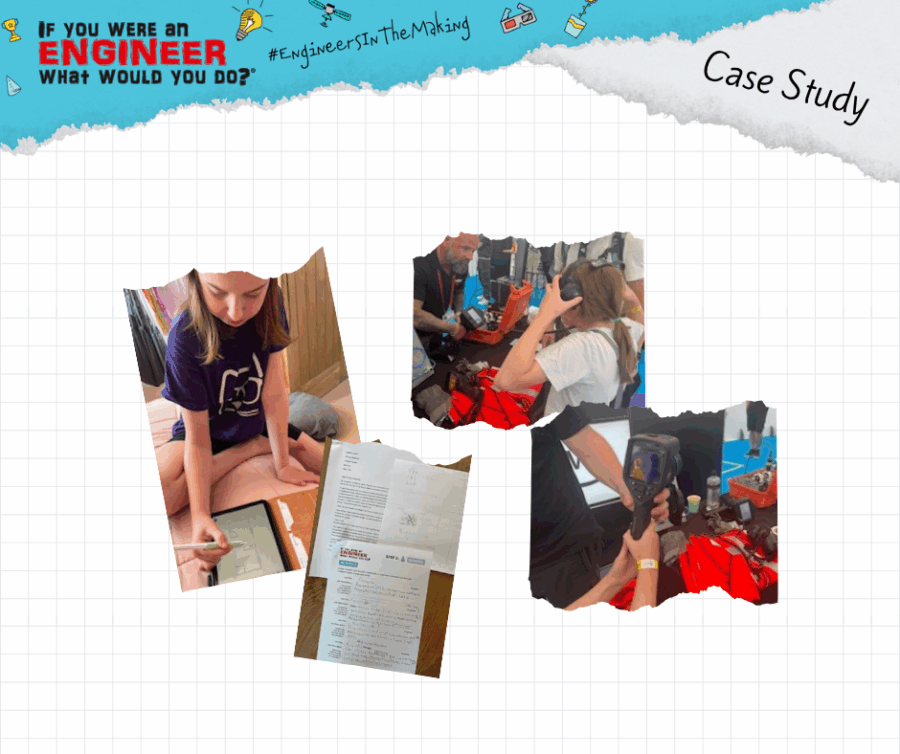
Case Study: Opening the door to engineering for home educators
Introduction
For many home educators, the freedom to tailor learning to a child’s interests is a significant benefit. However, this flexibility can also come with a challenge: finding opportunities that provide structured, real-world learning experiences. As home educator Emma discovered, many competitions and projects are designed exclusively for schools, leaving individual families and home educator groups on the sidelines.
This is the story of how Emma and her daughter Evie, found fun, learning, and creativity with the Primary Engineer “If you were an engineer, what would you do?” competition embedding it into their home education journey.
Why They Got Involved
Emma explained that “home education allows us to tailor learning to suit individual interests and needs” which is why they were looking for an educational competition which could be flexible. Evie, at 9 years old, “loves the idea that her learning contributes to something real or leads to a tangible outcome, as well as gives her the freedom to explore her interests.”
With this in mind, Emma began her search and quickly discovered that most options weren’t open or suitable for them. That’s when she came across Primary Engineer and the “If you were an engineer, what would you do?” Competition and despite never hearing of it before, felt it was ideal for them.
She sent a quick email to Primary Engineer’s Service Delivery team to double check whether home-educating families could participate and was met with an overwhelmingly positive response from Caitlin, who offered “so much support and kindness” and helped them get started. In fact, Emma commented to say that throughtout their experience “The support from the Primary Engineer team was fantastic—from answering our questions and providing Teams links to engineer interviews, to checking in with us and celebrating Evie’s achievement”.
What the Experience Has Been Like
Emma describes their experience as “absolutely brilliant” saying that “The competition helped Evie explore new ideas and gave her a way to apply her interests in a meaningful and exciting way. It allowed me the freedom both with the resources given to tailor the learning to Evie’s skill level. As well as giving her real insight into many careers and further studies.”
When teachers and home educators register for the competition they unlock instant access to our online teaching resources and workbooks. These have been curriculum-mapped resources against the educational curriculum of each nation (Scotland, England, Wales, and Northern Ireland) and tailored to different ages to seamlessly integrated into classroom/home learning, maximizing their effectiveness.
Talking about the resources, Emma said “The competition worksheets were incredibly valuable—they followed a real-world engineering design process and provided structure that felt both educational and practical. We’ve already begun to carry this approach forward in other areas. For example, we visited the RIAT Airshow, where Evie’s dad (an aerospace engineer) showed us around the STEM tents. These exhibits mirrored the same processes we learned through the competition, and it was great to see Evie making those connections. The experience has deepened her understanding of how engineering works in the real world, and we’ll continue using that framework in our STEM learning going forward.”
All submitted competitions entries are read and graded by professional engineers, with every single pupil who takes part receiving a named and graded certificate. They are graded based on the quality of the idea, not the quality of the drawing or the grammar and spelling of the letter. Shortlisted entries are then sent to exclusive judging days where the judges select two winners and two highly commended entries from each year group in each region.
Thinking about how a core part of the competition is engineer feedback and pupil recognition, Emma reflected to say “It’s incredibly important. In professional engineering, peer review and evaluation by experts is the norm. Having an actual engineer read and assess each child’s entry gives it real weight—not just as a competition, but as a learning experience. It tells children that their ideas matter and that professionals value their effort. As well as following the professional design process. As far as I know, no other competition offers something quite like this—especially not with the same level of accessibility for young people.”
One of the highlights for the family was seeing Evie’s confidence grow throughout the competition and seeing it open the door to all sorts of learning and skills development. “When her dad (a Systems Engineer) gave a vague explanation of his job, Evie was able to correctly identify where his role fits within the engineering process and how it connects to other disciplines. Evie chose to explore different types of engineering and even decided she wanted to become a civil engineer!” Emma explained. She continued to say “She also did a deep dive into MagLev technology (after she had the idea not knowing it already existed) . She researched how it works and then looked for ways it could be improved, going far beyond what’s expected for her age.”
Evie’s own enthusiasm is a testament to the competition’s impact. Evie said “I found it hard to come up with the idea as I’d never been asked the question before, but it was great to be able to do anything”. We are thrilled to hear that she’s already working on a new idea for the 25/26 competiton but keeping it under wraps until she’s ready to submit it.
Conclusion
The “If you were an engineer, what would you do?” competition has become a valued part of Emma and Evie’s home education journey.
“Projects like this offer real-world experience and exposure to careers and ability to explore ideas that traditional education might not touch on. Giving young people that kind of insight is vital for helping them find a path that suits them,” Emma concluded.
Huge thank you to Emma for sharing these valuable insights. If you have worked with us and want to share your experiences, contact us on marketing@Primaryengineer.com
